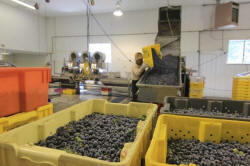|
China money, market spur
Canadian blueberry deluge
 Send a link to a friend
Send a link to a friend
 [August 04, 2016]
By Julie Gordon [August 04, 2016]
By Julie Gordon
RICHMOND, British Columbia, August 4
(Reuters) - An aging mansion sits vacant on an estate outside Vancouver,
the garage overtaken by a blueberry sorter and a walk-in cooler packed
with the fruit.
The owner, an investor from mainland China, leases the estate to Fred
Liu at such a bargain the farmer grows blueberries in its fields even
though the bottom has fallen out of the market.
As it turns out, the same wave of Chinese wealth that has fueled real
estate booms in cities like New York, Sydney and San Francisco and
stoked the art market worldwide also has contributed to an unexpected
glut of blueberries.
Chinese investors riding a hot property market along the Pacific Coast
have socked millions into a belt of protected farmland around Vancouver,
long a destination for Asian immigrants, and many have taken advantage
of Canadian agricultural tax breaks, agents and farmers said.
Because much of the land is restricted to farming, rents have remained
stubbornly low. Veteran farmers and entrepreneurial newcomers have
snapped up the cheap leases, eager to cash in on the blueberry's ascent
as a super food and the promise that a trade deal with China would open
the world’s second-largest economy to fresh Canadian exports.
But demand has yet to meet bullish projections. Delayed trade
negotiations and a surge in global blueberry production have prevented
China's rising middle class from eating enough of the British Columbia
bumper crop that Chinese investors helped sow.

The result: a bubble for Vancouver area farmland and a bust for berries.
Prices for rural property near Vancouver have surged – hitting, in one
recent deal, 230 times the per-acre average for Canadian farmland. And
blueberry prices have collapsed, dropping to less than C$1 per pound at
peak season, half what some growers said they were getting a few years
ago.
Norm Letnick, British Columbia’s agriculture minister, said he doesn't
see it as a glut, and he downplayed the sharp price drop at packing
houses.
Growers may be doing better at roadside stands, he said. "Because they
don't have a middle man, they might be making very good net profit."
For many farmers, that view misses the bigger picture.
"Rich people, they can buy the farms, but they don't want to do the
farming," said Liu, who grows organic berries for export to Asia. "It's
very, very, very cheap to lease their farmland."
But, he said, "farmers are not getting rich."
A LAND RUSH
About half the listings in recent years for smaller farms and nearly all
the larger ones near Vancouver have been purchased by buyers with ties
to mainland China, agents said.
Canada doesn’t track the nationality of property owners, and British
Columbia only began doing so in June. It reported 18 percent of sales in
recent weeks in Richmond, home to one of the most well-established
Chinese communities in Canada, were to unspecified foreign nationals
living abroad. Chinese nationals with resident status in Canada were
excluded.

The buying spree has set records. A 4.5 acre blueberry farm with no
house sold late last year to a Chinese investor for C$2.58 million
($1.97 million), or C$573,000 per acre. Nationwide, farmland averages
C$2,460 per acre, according to Farm Credit Canada.
The British Columbia Blueberry Council, a trade group representing
hundreds of growers, said much of the interest was from Chinese business
people who see berry farms as an export opportunity, much like those who
have bought vineyards in recent years to export British Columbia wine to
China.
Real estate agents said some Chinese nationals were looking at the
redevelopment potential, viewing farms as lottery tickets that would pay
out if urban sprawl one day forces officials to scrap strict
prohibitions.

[to top of second column] |

A worker empties blueberries into a sorting and cleaning machine at
Canwest Farms Ltd in Richmond, British Columbia on July 26, 2016.
REUTERS/Julie Gordon

"They're playing the long game," said agent Michael Lu.
Others have built luxurious estate homes with an eye toward retirement and
surrounded them with berries.
TAX BREAKS
Owners cut their taxes by using the land for farming, often leasing it out to
local growers. Owners like blueberries because they are pretty and easy to
maintain, especially compared to the province’s No. 2 produce export –
mushrooms.
Discounts vary by municipality, but, across the province, farmland is taxed at
lower rates, so long as it earns at least C$2,500 a year from crops.
In Richmond, for example, a 4-acre farm with a basic house paid taxes of C$1,025
per year, according to a 2014 Metro Vancouver study. The same plot, without farm
classification, would pay C$10,511 annually.
"If it's not farmed, the taxes are going to be high," said Dale Badh, a real
estate agent and berry farmer.
British Columbia growers also are playing a long game – but not by design. The
province produces 80 percent by value of fresh blueberries exported by Canada,
the world’s No. 2 producer.
Like farmers elsewhere, they went big into blueberries, encouraged that the
touted health benefits would stoke the market.
They also were banking on trade talks with China. A China cherry deal, finalized
in 2014, boosted export values 70 percent in one year.
Newcomers have leased plots from absentee landlords because they can't afford to
buy their own, and long-established farm families have rented additional plots
because they are cheap.
Together, they pushed British Columbia’s blueberry yields up 71 percent from
2010 to 2015.

But the trade talks dragged on for nearly a decade. A deal, finally reached late
last year, is expected to boost the province’s fresh exports to China up from
C$24,466 in 2015 to C$65 million - eventually.
In the meantime, British Columbia's blueberry growers are doing what they can to
hang on. Farmer and packer Humraj Kallu has stopped buying from other growers
because it's all he can do to sell what he produces.
"I'm dealing in only my berries," he said, adding: "Farming is not the most
viable thing in B.C."
($1 = 1.3071 Canadian dollars)
(Additional reporting by Elizabeth Dilts; Editing by Jeffrey Hodgson and Lisa
Girion)
[© 2016 Thomson Reuters. All rights
reserved.] Copyright 2016 Reuters. All rights reserved. This material may not be published,
broadcast, rewritten or redistributed.
 |